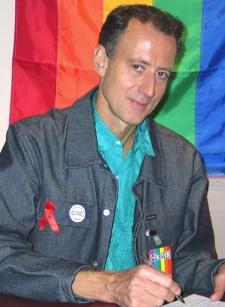Changes to Canada’s refugee system being mulled by Immigration Minister Jason Kenney could have a disproportionately adverse effect on queer refugee claimants.
Kenney has been musing openly about instituting United Kingdom-style reforms to the refugee system in the wake of the abrupt decision to impose visa restrictions on visitors from Mexico and the Czech Republic.
But British queer rights activist Peter Tatchell, who has worked extensively with asylum seekers, says that Canada must reject the UK asylum model.
“It would be a gross injustice if Canada adopted a UK-style asylum system,” says Tatchell. “The British asylum process is deliberately rigged to reject and deport as many refugees as possible, regardless of the merits of individual cases.”
Tatchell says the system is based on the presumption that all refugee claims are bogus and fraudulent.
Janet Dench, executive director of the Canadian Council of Refugees, adds that the system is geared to finding ways of saying no to claimants.
“The people who are within the system are much more likely to be looking for a rationale for rejecting people rather than a system which is based on the principle of respect for human rights,” says Dench.
Dench also warns about Kenney’s position that claimants who come from so-called “democratic” countries can’t be legitimate refugees. One reform Kenney is mulling is creating a list of “safe countries,” so that claimants from them can be fast-tracked through the process, with an eye to rejecting them sooner.
“What we know is that in many countries that seem democratic and hold elections and where straight people may be able to lead normal lives in, there is often a high degree of homophobia and violence against gays and lesbians,” says Dench. “Gays and lesbians I think are one of the populations that would be suffering the most from the targeting by the minister from claimants from so-called democratic countries.”
“The UK asylum system is grossly insensitive to [queer] refugees,” Tatchell agrees. “Even when it is proven that they have suffered detention, torture and rape, asylum judges often order them to return to viciously homophobic countries like Jamaica, Iran and Uganda. They say that it is safe for [queer] refugees to return to these countries because they can change their names, move to a part of the country where no one knows them and stop having same-sex relationships. Then nobody will know that they are gay and they won’t be persecuted, say some judges.”
Both Tatchell and Dench warn of other characteristics of the UK system that adversely affect refugees.
“Pending their asylum hearings, many are held in detention centres, which are basically prisons,” says Tatchell. “This is a highly traumatic experience for people who have fled imprisonment in their home countries.”
NDP immigration critic Olivia Chow is opposed to implementing a UK-style system in Canada.
“It’s not arm’s-length,” Chow says. “It’s bureaucrats rather than a tribunal approach,” noting that such a system empowers individual immigration officers to reject claims before they reach tribunal.
Chow also points out that the system is inconsistent and ineffective. There is a high rate of rejections overturned in appeal in the UK — a quarter of all decisions, according to The Canadian Press.
“I’m going to reserve judgement as to where we need to go in reference to this particular example, but there’s no question that the status quo is no longer an option,” says Liberal immigration critic Maurizio Bevilacqua.
Bevilacqua cites the lack of appointments the government made to the IRB in creating the backlog, and has been looking at ways to improve our system.
“It needs be improved in a way that it makes the system more efficient, effective, as well as of course protecting due process and Charter issues related to refugees as well as Canada maintaining its reputation in the international community as a fair and just society,” Bevilacqua says.
Bevilacqua points to proposed changes to the system coming in the fall, and those changes could include the long-awaited implementation of the Refugee Appeals Division. Not only did Kenney publicly express his openness to it as part of a broader reform package, but Bevilacqua echoed the sentiment.
Bloc Québécois immigration critic Thierry St-Cyr’s Bill C-291 is currently before the immigration committee. The bill would see the appeal process implemented. St-Cyr was unavailable for comment.
Chow says that she is open to discussing changes to the system, so long as they are made in good faith.
“Genuine consultations means a give-and-take” Chow says. “Let’s have a conversation about what is it that works and does not work. Let’s not repeat past mistakes.”
Chow adds that the current system is not broken, but it needs more resources, the appeal division, and an end to political appointees on the IRB. The Tories drew fire this year after they appointed Doug Cryer, the former director of public policy of Evangelical Fellowship of Canada, to the refugee board. He has previously referred to homosexuality as a sin, which lead many to question whether he could fairly rule on queer refugee claims.
Bevilacqua adds that any reforms must not only be effective, efficient and transparent, but they must also produce a system that is flexible.
“No system should unjustly penalize individuals because they may be coming from a country who may be democratic,” says Bevilacqua. “When you’re dealing with human lives, there has to always be a flexibility where you have exceptions but I am 100 per cent behind the sound reform and improvement of the refugee system.”


 Why you can trust Xtra
Why you can trust Xtra


